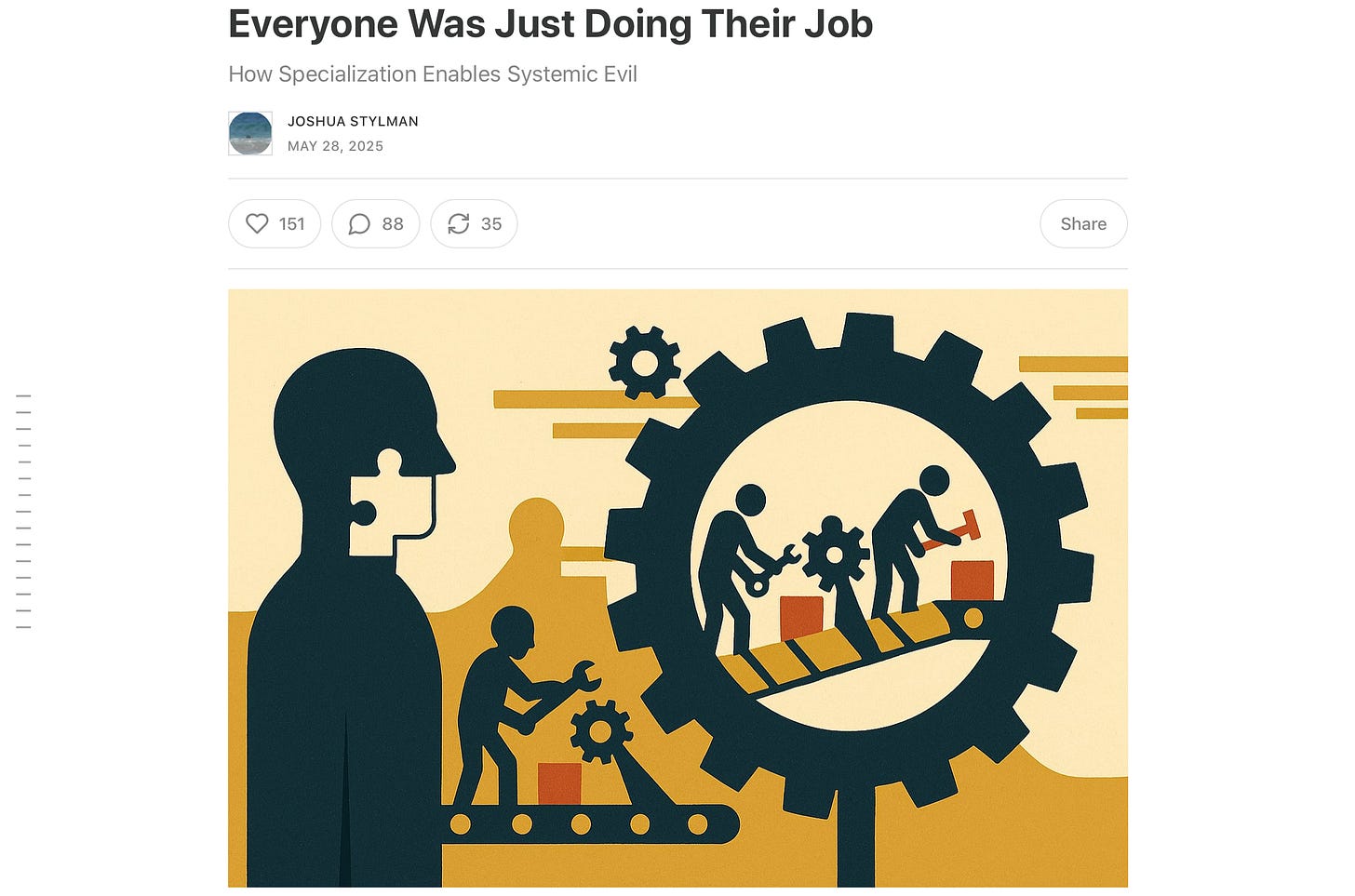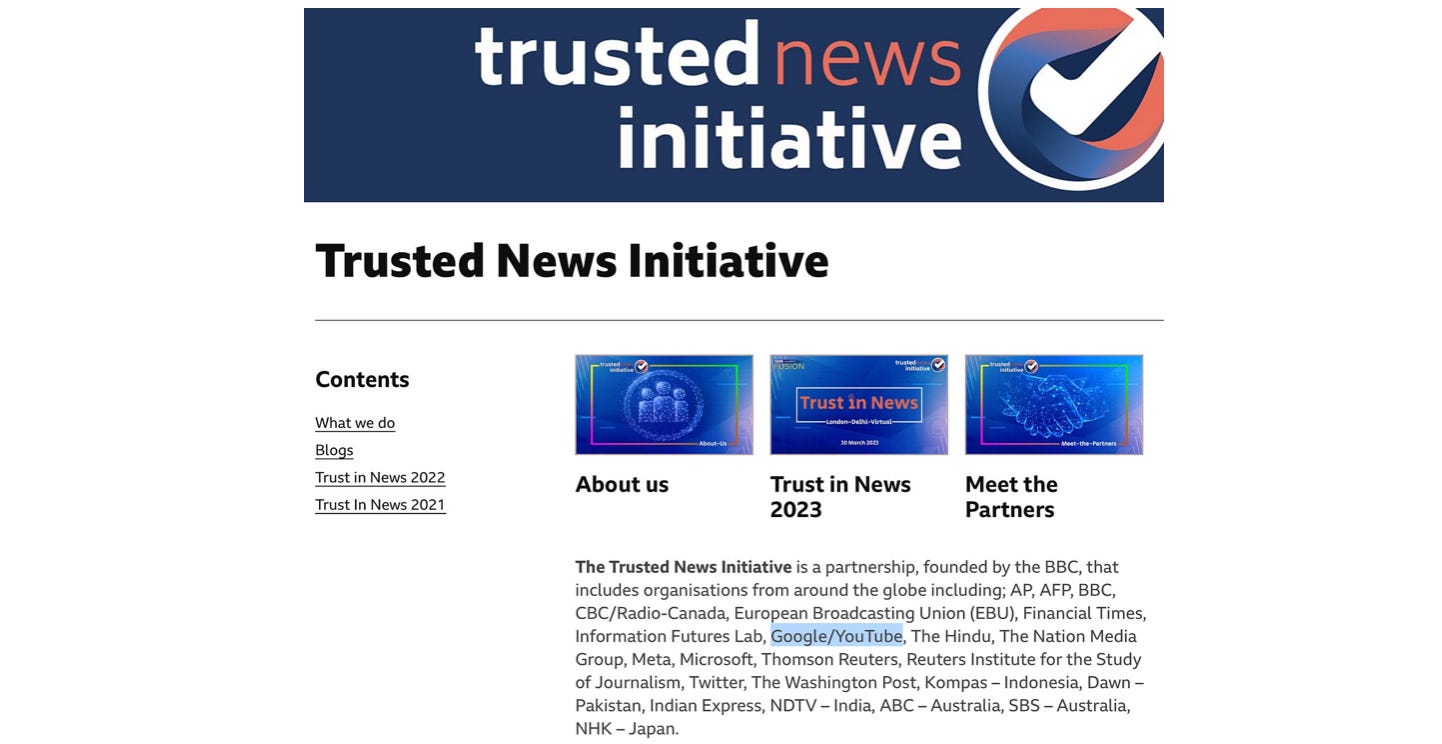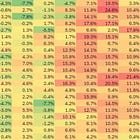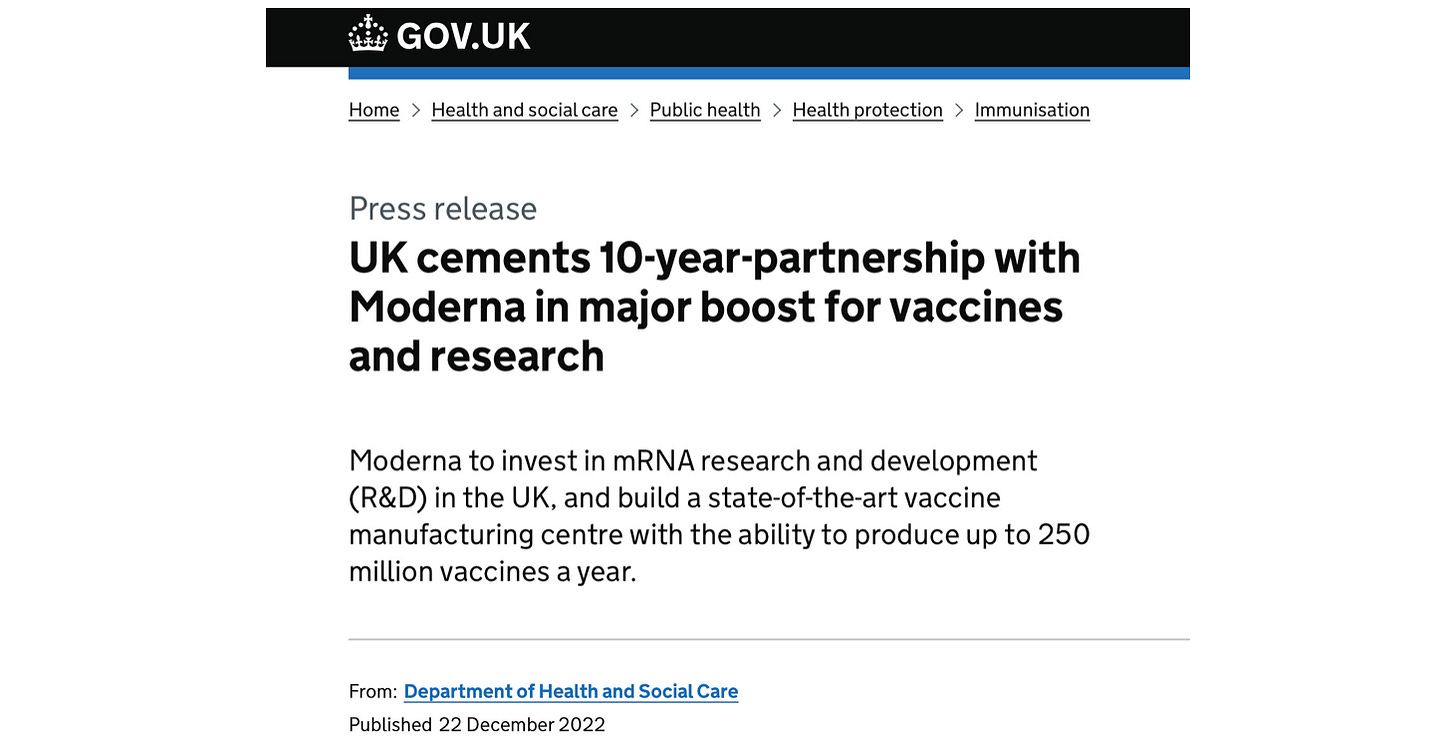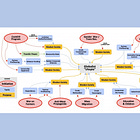Dear Church Leaders (and everyone else)
Further to this post…
…based on an article by entrepreneur and investor Josh Stylman, I thought it worth highlighting another of his articles:
Some thoughts and comments on what he says can be found below.1
Stylman begins by pointing out how:
The world’s a screaming match — doctors, economists, influencers, all clawing for their slice of truth. Nobody’s listening, and nobody’s seeing the whole damn picture. We have more information than ever, but we’re dumber where it counts, stuck in a loop of shouting past each other. This isn’t just politics or algorithm nonsense; it’s the cult of specialization — our worship of experts who know everything about nothing.
He is clearly exaggerating somewhat to make his point here, but not much. And he is writing from a US perspective.
He cites examples from recent years:
Doctors pushing Covid shots didn’t see the fraud. Economists missed the heist. Engineers built surveillance without blinking. Each turned their screw, blind to the machine they were feeding — a Moral Assembly Line where systemic evil thrives.
And he pushes back against the notion that the system is broken [Emphasis added]:
The system’s not broken; it’s built to break us, and we’re all complicit until we start connecting the dots… we’ve confused credentials with wisdom, compliance with intelligence…
He argues that:
…we’re not failing because of bad experts — we’re failing because specialization itself has become the operating system of institutional evil.
For what it’s worth, I think there is a case to be made that both are to blame. And that experts can be bad in more than one way, e.g. corrupt as well as incompetent. The love of money is a root of many kinds of evil…
Stepping back, I doubt that there is anyone seeing the whole picture, but there are certainly some who are much further ahead than others on that, and who are bringing strong evidence to back up what they say. And they are not typically the people portrayed by the media — or indeed those considered by wider society — as “experts”.
A Society Talking Past Itself
Step into any barroom [pub] debate, X thread, or YouTube comments section, and it’s chaos — facts flying, no one landing.
We’ve outsourced our brains to specialists who slice reality into bits too small to mean anything. A cardiologist can’t talk vaccines. An economist reduces geopolitics to models, blind to the real forces at play. Everyone's got their PhD in one inch of the world, and we're dumber for it.
I am reminded of my father saying to me as a teenager that, as specialists get to know more and more about less and less, they end up knowing everything about nothing.
I could see that well enough, even back in the day. And I see it much more clearly now, not least in the context of the university city where I live. I know many specialists in both academia and industry. And I have no doubt that some would (quite reasonably) describe me as such.
But Stylman goes rather further than my father did, and, in the context of the events of recent years, with good reason:
Specialization doesn’t just fracture understanding; it’s the architecture of control, ensuring no one sees the crimes — medical fraud, wealth theft, digital chains — unfolding in plain sight.
By digital chains, I presume he means restrictions based on the digital ID increasingly being pushed by our governments on behalf of our invisible governors — digital ID that is being touted as a solution to the problems that they helped to create, whether accidentally or not. It seems that few people yet realise how this could lead to unprecedented levels of totalitarian control. Though there are signs that suggest people may be waking up. Have England football fans ever chanted like this about any previous Prime Minister — of any party, let alone Labour, and less than a year into their tenure?
Stylman contends, presumably in the context of the barroom debates, X threads and YouTube comments sections, that:
We’re not arguing because we’re stupid; we’re arguing because the system keeps us siloed, complicit, and clueless.
And he definitely has a point there. Though part of the problem in my part of the world is that few people are arguing, i.e. engaging with the issues that he mentions in this article, much at all. Including those who might be expected to care more than most about evil.
Medical Blindness: Expertise Without Vision
Stylman goes on to focus on two examples from the covid era:
the way that doctors in the US ignored the country’s VAERS [Vaccine Adverse Events Reporting System] and assumed that the FDA was trustworthy
the way that journalists mocked those advocating actually safe and effective medicines such as ivermectin
In my experience, people in the UK responded similarly, irrespective of the evidence presented. I find it extraordinary how, even now, so many people seem incredulous at the notion that a vaccine — let alone a novel technology injection of synthetic mRNA — could do more harm than good. And how people still seem to have faith in the likes of a regulator such as the MHRA. I also find it striking that so many still trust the BBC, which, among other things, played its own part in attacking ivermectin.
I wonder what it would actually take to change hearts and minds.
But Stylman contends that:
[Such people, i.e. the doctors and journalists] weren’t idiots; they were cogs in a machine built by the Rockefeller model of medicine, which, since the 1900s, turned healers into assembly-line technicians — prescribe, cut, bill, repeat.
And that:
During Covid, this enabled a fraud of historic scale.
He emphasises that:
This isn’t just about doctors being wrong — it’s about a system that rewards institutional obedience over critical thinking…
And he provides multiple examples in relation to the so-called covid vaccines to back up his point: fraudulent trials, safety signals buried, long-term safety ignored etc.
He points out that:
Most people don’t realize that if there were effective treatments for Covid, these experimental drugs couldn’t have been approved under emergency authorization — but that’s exactly what happened.
And the media, not least the Trusted News Initiative, founded by the BBC, played a key role.
That meme exaggerates the point, but not much.
Covid: A Masterclass in Fragmented Fraud
Stylman contends that:
Covid was a crime scene where every expert played their part, blind to the whole.
I am reminded of the ancient parable of the blind men and the elephant, which I was somewhat surprised to find on this UK government webpage dated April 2020:
In the story, several blind men interact with a different part of the same elephant, assuming that what they are interacting with is the whole elephant.
They do not see that they are interacting with one piece of something bigger and more complex.
Stylman describes various forms of compartmentalisation, starting with the medical type:
The fraud started with PCR tests. Kary Mullis, PCR’s inventor, said in the 1990s it’s not a diagnostic tool — it amplifies anything, not just active virus.
He adds that:
His voice would have been important during the pandemic since the whole thing was based on his invention. Sadly, he died in August 2019.
Quite.
I wrote about Mullis in more detail here:
Like former medical physicist Christine Padgham, I knew enough to know for sure from the way that testing was being handled in 2020 that something bad was afoot.
And any lingering doubts I might have had were quashed by the manner in which credible voices raising reasonable questions about the testing were suppressed. And the fact that the UK government refused to disclose the false-positive rate.
Stylman points out that:
The shots were the centerpiece: trials manipulated… adverse events like myocarditis suppressed, and EUAs granted only because alternatives like ivermectin and hydroxychloroquine (HCQ) were demonized. A 2020 Henry Ford Health System study showed HCQ cut mortality when used early [this was far from the only such study], but the FDA smeared it as ‘dangerous.’
And that:
…FDA advisor Dr. Eric Rubin, editor-in-chief of the New England Journal of Medicine, openly admitted: “We’re never going to learn about how safe this vaccine is unless we start giving it. That’s just the way it goes.” They were experimenting on children in real time, and saying it out loud.
“Experts” acted as though the Cutter Incident and thalidomide and Pandemrix — to name but three shameful episodes in medical history — never happened. I find it hard to believe that that was purely down to incompetence.
But in any case, words like Rubin’s confirm what an ever-growing number of people have come to realise, i.e. that the covid injections were an experiment on a grand and unprecedented scale. I wonder if he is familiar with the Nuremberg Code as described in this 1996 BMJ article (pdf here):
Looking back, it seems clearer than ever to me that, in the covid era, it was not a case of novel technology injections being created for a public health emergency, but a public health emergency being created (or at least prolonged) for novel technology injections.
Stylman then turns his attention to various other forms of compartmentalisation, giving personal examples to illustrate the broader thrust of the article:
Economic…
Lockdowns crushed small businesses while Amazon and Pfizer raked in billions — a $4 trillion heist disguised as relief. Economists, buried in GDP models, missed the human toll. Gold [enthusiasts] and bitcoiners warned of inflation and a widening wealth chasm, but they weren’t credentialed economists, so no one listened… [Covid support measures], sold as aid, prepped the ground for central bank digital currencies (CBDCs), but economists didn’t study monetary control. They enabled theft, oblivious to their role.
Psychological…
Lockdowns spiked depression, addiction, and child developmental delays, yet behavioral scientists were absent from task forces. Public health dismissed mental health as “non-essential.” A school counselor I know saw teen suicides soar but had no policy voice. She saw the damage but still enforced closures, believing she was following “expert” guidance. The trauma wasn’t her department.
Even now, I see little by way of recognition of the extent of the trauma of the covid era.
And technological…
Engineers built vaccine passports and contact-tracing apps, sold as “public health.” They didn’t ask how these fed The World Economic Forum’s digital ID plans or CBDCs’ programmable money. A tech developer I met saw his app as “innovation,” not surveillance infrastructure. His job was to code, not question geopolitics. Each layer deferred upward, building a control grid no one claimed…
“Just Doing My Job”: The Moral Assembly Line
Stylman points out perceptively that:
Specialization doesn’t just split knowledge — it splits guilt. This is the Moral Assembly Line: everyone turns a screw, no one owns the machine, and when it crushes lives, they say, “It wasn’t me.”
“I was just doing my job.”
During the covid era: government ministers, civil servants, public health officials, company directors, senior and middle managers, hospital administrators, doctors and nurses, school and university leaders… And church leaders…
He adds that:
In the Holocaust, Adolf Eichmann scheduled trains, not murders. During the MKULTRA experiments, psychologists dosed subjects with LSD, just following CIA orders. During Covid, doctors pushed shots, HR fired the unvaccinated, and journalists parroted identical phrases across every network — “safe and effective,” “no one is safe until everyone’s safe.”
And, more broadly, notes that:
Friends enforced vaccine requirements at parties, thinking they were protecting people, not coercing choice. No one felt like a criminal, but the outcome was fraud, harm, and eroded freedom. Evil hides by breaking itself into pieces too small to feel.
At some stage, those who are charged with preaching from the pulpit will surely have to grapple with the above. Although it might perhaps be argued that, in some ways, it is not a new phenomenon:
The Design of Disintegration
Stylman contends that this is no accident:
This is by design. Universities churn out specialists, not synthesizers — papers, not questions. The corruption runs deeper than most realize. Universities don’t just churn out specialists — they create a credentialed class psychologically invested in defending the system that elevated them, even when that system causes harm.
That last point is really important.
He also points out that:
Medical boards punish doctors who stray, like those who prescribed ivermectin. Funding rewards obedience, not curiosity. Peer review is peer pressure, silencing dissent…
And that this creates what he calls “epistemic capture”:
…experts know only what their field allows. A virologist might doubt a shot’s efficacy but not its funding. A journalist might report mandates but not trial fraud. They’re cogs in a machine they can’t see, ensuring we stay complicit and clueless. [Emphasis added]
Blind Spots of the Highly Educated
Returning to a theme of his pattern recognition post, Stylman notes that:
Specialization blinds even the sharpest to the big picture. Doctors enforcing passports didn’t see their connection to Agenda 21’s population tracking framework from 1992. They didn’t connect apps to CBDCs, which the Bank for International Settlements piloted to control spending. Local health officials in my area justified apps as “stopping the spread,” unaware they fed systems that could lock accounts for non-compliance. Why? Geopolitics isn’t their field.
Perhaps “the sharpest” are not so sharp as they (and others) might think.
These words of Isaiah — some of which I cited in this post on inversion — spring to mind:
Woe to those who call evil good and good evil, who put darkness for light and light for darkness, who put bitter for sweet and sweet for bitter. Woe to those who are wise in their own eyes and clever in their own sight. [Emphasis added]
Stylman observes that:
The World Economic Forum’s Great Reset is public, yet most doctors never read it.
And:
Intelligence without context isn’t just useless — it’s a weapon for power.
And he points out that:
The most educated became the most complicit. While PhD epidemiologists enforced lockdowns and cardiologists pushed shots, plumbers and mechanics saw through it immediately. They didn’t need peer review to recognize bullshit — they fix things that actually work. The people who make stuff understood: if the solution doesn’t match the problem, something’s wrong. Meanwhile, the credentialed class defended every policy failure because their status depended on institutional trust. [Emphasis added]
I am reminded of Rev Dr William Philip’s perceptive comments in Going against the flow concerning the medical profession during the covid era, and how those who have been to university have been propagandised in ways they do not even recognise.
And also of this meme:
The Mockingbird Media: Silencing the Truth
Stylman goes on to highlight the role of the media:
Media seals the trap. Operation Mockingbird, a CIA program to shape narratives, never died — it's alive in today’s censorship…
I discussed Operation Mockingbird here…
…to provide context for this post (which is the follow-up to the Only Connect post featuring the other Stylman article):
He highlights how:
Vaccine injury stories, like those in Anecdotals, a documentary I produced with talented filmmaker Jennifer Sharp, were banned from YouTube. She poured her soul into showing real people — mothers, teachers, children — harmed by shots, but algorithms erased it.
YouTube is part of the Trusted News Initiative:
And those algorithms were created (and applied) by people. People who I guess would say, “I was just doing my job.”
He adds:
The silence runs deeper. My friend Pamela lost her stepson, Benjamin, to the shot. [She]… begged her stepson not to get it, but he needed to keep his job…
In parts of the US, covid injections were required to go to university.2 And school. And even some churches.
Pamela screamed from the rooftops, but no reporter would touch her story. Yet you can be sure — if her stepson had died from Covid, they’d have been fighting for the exclusive. Instead, we got montages of “safe and effective” while they buried the bodies. The people trying to warn us sounded crazy because the media made them invisible.
He points out that:
Pamela’s story, as tragic as it is, isn’t rare. I personally know dozens. We all have stories. The true number is totally unknown.
Some indication of the numbers in the US comes from life insurance data such as that featured in this post:
And official disability data such as that recently highlighted here:
In the UK, there is strong evidence of a similar pattern, again from official data:
And yet even now few people are talking about it. Including public health officials and doctors, despite the duty of candour.
Stylman adds:
What makes it worse? It’s accelerating. As more shots get pushed on the vulnerable, as boosters become routine, the Pamelas will multiply, their stories will remain untold, and the machine will keep grinding forward.
I wonder how this 10-year partnership announced in December 2022 is progressing…
“Up to 250 million vaccines a year”
Even now, I sense that most people do not even consider the possibility that there might be a connection between a recent deterioration in their health and the novel technology injections that they have taken. It is perhaps worth reiterating here that there are — as courageous and ethical GP David Cartland, featured in this recent post, points out — various routine tests to check out whether there might be a connection.
Stylman continues:
Journalists didn’t cover these stories… The public stays clueless, fed a media diet of propaganda.
And contends that:
This isn’t incompetence; it’s control, ensuring we only see what the system allows, keeping us talking past each other.
Stepping back, he makes the case that:
Covid wasn’t an exception — it was a perfect example of how compartmentalized systems commit coordinated harm.
Adding that:
…the same pattern repeats everywhere: in finance, education, climate policy, and tech. Everyone plays their role. No one owns the outcome… [Emphasis added]
Beyond Medicine: Complicity Everywhere
He then exemplifies how this pattern is universal, enabling harm while absolving guilt:
Finance (2008): Traders chased derivatives, missing the housing bubble… They weren’t stealing — they were working, blind to the crash.
Education: School boards implemented Common Core [a US education initiative] without consulting child development experts… administrators pushed digital learning without understanding its psychological impact on students.
Climate: Climatologists model emissions while ignoring weather modification. Policy experts implement Davos agenda while ignoring that those pushing green policies don’t live by them. No one owns the dysfunction.
AI/Tech: Engineers build addictive algorithms, ignoring polarization. CEOs chase profit, not sociology. They fracture society, feeling nothing.
Military: Analysts tout drones, ignoring cultural fallout. Bureaucrats plan wars without local knowledge. No one’s a war criminal — just a professional.
And turns to consider how the problem might be addressed.
The Generalist: Breaking Free from Spectator Culture
Stylman contends that:
We need generalists…
He points out that:
Before industrialization, healers and polymaths wove together physical, spiritual, and social knowledge.
In contrast:
Today, we’re consumers of expertise, not creators of understanding. We’ve become a spectator culture, watching life happen while trusting someone smarter has it handled.
That is consistent with much that I observe.
And, at least in some cases, woe betide anyone questioning the trusted “someone smarter” — no matter what the evidence the sceptic might present.
He makes the case that:
The price of convenience is competence. We can’t change a tire, grow food, read a study, or think without calling an expert.
And he again links this with education levels:
The more educated we are, the more we defer to credentials over judgment.
I am reminded of what he says in Read Between the Lies: A Pattern Recognition Guide — cited in the Only Connect post I mentioned earlier:
The professional-managerial class proves especially susceptible to [media] programming. Their expertise becomes a prison of status — the more they’ve invested in institutional approval, the more fervently they defend institutional narratives. Watch how quickly a doctor who questions vaccine safety loses his license, how swiftly a professor questioning gender ideology faces review, how rapidly a journalist stepping out of line gets blacklisted.
The system ensures compliance through economic capture: your mortgage becomes your leash, your professional status your prison guard. The same lawyers who prides themselves on critical thinking will aggressively shut down any questioning of official narratives. The professor who teaches “questioning power structures” becomes apoplectic when students question pharmaceutical companies.
Back in Everyone Was Just Doing Their Job, he cites the work of E. O. Wilson, Nassim Taleb and Ivan Illich who, for all their flaws, knew/know that outsourcing thinking is outsourcing agency. And he makes the case that:
We must become intellectual sovereigns, thinking across fields, seeing patterns specialists miss.
As to how that might work in practice, he gives a couple of examples:
A doctor should understand pharmaceutical economics. An economist should grasp human psychology.
And adds that:
Pattern recognition is what separates participants from observers, thinkers from consumers of thought. It’s how you stop being a cog and start becoming a sovereign.
I agree.
But I wonder how many people actually want to stop being a cog. It takes effort and courage, and it can be costly. It is often discomfiting to go against the flow, even — or perhaps particularly — in a church environment. It is rather easier for people to keep their heads down and to comply with the system. At least for now.
As to pattern recognition, effort is necessary there too. Not least in that it requires us to think for ourselves rather than letting others do our thinking for us. And the realisation of what is actually going on is not a comforting or reassuring one.
Moreover, pattern recognition does not necessarily come naturally to everyone. Some people — and it’s often not the credentialed “experts” — are rather better at joining the dots than others.
And yet the authorities, including the leaders at the church I attend, are typically disinclined — to say the least — to engage with what those skilled in pattern recognition are saying. Perhaps they find it hard to accept that those who are most able to recognise what is happening are not university professors, or public health officials, or senior doctors, or company directors. Maybe it is difficult for them to come to terms with the fact that it is not only in the cross of Christ that God makes foolish the wisdom of the world.
More broadly, it might seem daunting to be asked to be “thinking across fields, seeing patterns specialists miss”. But often what is missing is people raising basic questions that almost anyone could be asking — both in private and in public — such as:
Why would doctors tell us that a new medical product is safe when we have obviously have no long-term safety studies?
What evidence would we have of “global crises” in relation to “pandemics” and “climate change” if we ignored the media? Why are the strategies used to push such narratives so similar? And why do the solutions to such “crises” typically involve [i] loss of freedom, [ii] more authoritarian control, and [iii] the rich getting richer at the expense of the rest of us?
Given that the mainstream media, including the BBC, has plainly been propagandising us about gender issues for years, why should we think that they have not been doing something similar in other areas?
On some topics, it helps to have a good memory and/or something of a grasp of history. But here too it is not difficult to see basic questions that few people are asking. Such as:
Re the conflict in Ukraine, how does NATO’s encroachment towards Russia square with promises made to the Soviets back in the early 1990s?
And how different is NATO’s engineering of wars from the WHO’s engineering of pandemics?
And even when reading an academic paper, there are some fundamental questions worth asking even if you don’t know or understand much about the detail:
Where might there be a financial conflict of interest here?
Is this paper based on computer modelling or real-world results?
Where can I find anonymised supporting data for this study?
And if the answer to that last question is that the data is not available, you might reasonably ask why…
Back to Stylman…
Escaping the Machine: From Cogs to Sovereign
He points out that:
This isn’t politics — it’s cognition.
And reiterates:
We’ve become passive observers, outsourcing not just tasks but basic thinking. We can’t fix a car, preserve food, or question a medical mandate without feeling unqualified. A generation ago, people solved problems themselves. Now, we call authorities, and the smarter we think we are, the more we defer.
This is not necessarily an issue in and of itself.
For Stylman, the question is:
…what happens when the system leads us astray — not through the malice of its participants, but through the malice of its designers?
He makes the case that:
The doctors recommending drugs, the engineers building apps, the journalists reporting stories — they’re not evil. But the system they serve was designed by those who are.
I’d be interested to hear more about how he thinks the system was designed. It’s not clear to me who the designers are. But I am reminded of what Paul writes about Satan’s servants masquerading as servants of righteousness.
As to people being evil, I am reminded of these words of Jesus in the Sermon on the Mount:
‘Which of you, if your son asks for bread, will give him a stone? Or if he asks for a fish, will give him a snake? If you, then, though you are evil, know how to give good gifts to your children, how much more will your Father in heaven give good gifts to those who ask him! So in everything, do to others what you would have them do to you, for this sums up the Law and the Prophets. (Matthew 7:9-12, emphasis added)
But I think it is fair to say that most people are not evil in the way that most people would define evil. And that much evil is enabled and advanced by what might, in the context of Revelation 13, be called the “beast system”.
Specialization has made us passive, watching life happen while trusting the credentialed. But they’re [the credentialed are] cogs too, trapped in a machine they don’t see.
That last sentence makes an important point. Although I do increasingly wonder to what extent the blindness is wilful.
As Stylman sees it:
Understanding this reveals the deeper architecture: specialization connects to other systems of manufactured dependency — fiat currency that separates us from real value, digital convenience that erodes our capabilities, spectator culture that makes us passive consumers. Each system reinforces the others, creating a web that requires seeing the whole picture to break free.
And he returns to the theme of stopping being a cog and becoming a sovereign:
The way out is radical responsibility. Stop outsourcing your thinking.
And/or at least listen to others bringing credible evidence that challenges the consensus of the mainstream media that is part of the system.
The path forward begins with recognizing that what we’ve been taught to value as ‘expertise’ has been weaponized against us. Questioning institutional narratives isn’t a sign of ignorance but a necessary act of intellectual sovereignty.
He suggests some questions to ask when an “expert” tells us something:
Who benefits? What’s hidden? What would another field say?
And urges people to:
Read outside your lane — doctors, study economics; economists, learn biology.
We do need specialists. But we need specialists who are willing to think about the bigger picture, or at least to pay attention to others who are doing so.
Check primary sources yourself… trace the funding.
This is not necessarily difficult to do. But there is of course the issue that some people have very limited time for such things. And that is one of the reasons why I post the articles that I do — with a view to providing accessible information with plenty of links for those who want to investigate further.
Stylman also urges his readers:
Follow researchers like Catherine Austin Fitts, who documented how the government has misplaced $21 trillion — not million [or billion but] trillion — with no accountability…
And:
Connect with those who think differently.
This is another reason for posting as I do, highlighting the work of others. And there are plenty of recommendations of other writers on the homepage, although only a few appear at any given time:
No source is perfect of course, and it is important to think carefully when reading anyone’s articles, including mine. But I particularly recommend following those who had both the insight and courage to speak out in 2020/2021. And supporting some of them in their work where possible.
The Incalculable Cost: Generational Harm and the Illusion of Reform
At the end of the article, Stylman returns to the theme of the covid injections, which are illustrative of many aspects of how the system works:
The damage is generational, hiding in plain sight. MAHA [the Make America Healthy Again movement] celebrates that the White House quietly removed Covid shots from healthy people’s schedules, but critics rightfully point out the deeper problem: there’s lots more coming on the vaccine schedule. Yes, the trend line may be in the right direction, but how many more unsuspecting people are going to suffer between now and then? Those who don’t understand this system is rotten to the core will still listen and get injected…
There is no shortage of people who seem determined not to suspect much at all, particularly when it comes with the label “vaccine”. And there will no doubt be a concerted effort to get those millions of Moderna mRNA “vaccines” mentioned earlier into people’s arms. But it is worth noting how the financial markets view the company:
As Stylman sees it:
The system worked perfectly — create the illusion of reform while continuing the harm to the most vulnerable. It’s in VAERS, with over 30,000 deaths reported; in insurance data showing rising claims; in stories like Pamela’s that never make the news. The system distributed the harm so widely no one can see it whole.
He concludes by urging his readers:
Be the generalist. See the system. The truth depends on it. The future won’t be saved by the most credentialed. It’ll be saved by those who can see clearly — and refuse to look away.
And, it might perhaps be added, by those who take notice of such people, and who speak out themselves.
Postscript
As a postscript, I should at least acknowledge very briefly here that there is of course a bigger picture when it comes to systemic evil. I wrote about some aspects of it in this post:
But I also want to address those who might be inclined to metaphorically bury their heads in the sand and say, without actually engaging much with the issues discussed above, something like, “We just need to stick to preaching the gospel.”
To which others might reasonably respond: “If only you’d done that during the covid era…”
Among other things, they might also point to the account of John the Baptist’s execution, where it does not seem to be preaching the gospel that is the main issue. And to what Rev Dr Joe Boot says in the interview featured in this post:
But in any case, as a body of Christian believers we are surely at some stage going to have to come to terms with the fact that, however good our intentions might have been, we have not been uninvolved in the systemic evil of recent years.
As to where we go from here, there is plenty that could be said, but this verse from Ephesians springs to mind as a good start:
Put off falsehood and speak truthfully to your neighbour…
Related:
Dear Church Leaders homepage
Some posts, including a version of this one, can also be found on Unexpected Turns
Revealing Faith: Seeing and believing the revelation of God (to be published July/August 2025)
The Big Reveal: Christianity carefully considered as the solution to a problem
I have retained the American spellings in the quotations
At least until recently, covid injections were, as I understand it, still a requirement at some institutions




